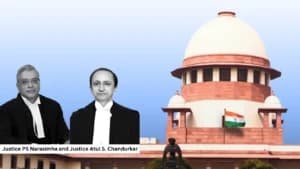The Supreme Court recently delivered a crucial judgment, stating that for an offense of abetment of suicide under Section 306 of the Indian Penal Code (IPC), the alleged harassment must be so severe that the victim is left with no option but to take their own life. The court quashed the charges against the accused, observing that there was no direct evidence proving that they had intentionally provoked the deceased to commit suicide.
Case Background
This case originates from Saharanpur, Uttar Pradesh, where a young woman, Tanu, died by suicide. The case was linked to the death of Ziaul Rahman, the son of the first appellant, Ayyub. The complaint alleged that after Ziaul Rahman’s death, the accused blamed Tanu and made humiliating remarks like:
"Because of you, our boy has died. Why don’t you die too?"
The complainant claimed that due to this mental harassment, Tanu felt humiliated and took her own life. The victim’s family filed a case under Section 306 IPC, holding the accused responsible for her suicide.
Read Also:- Supreme Court Highlights FIR Omission as Critical Evidence Under Section 11 of the Evidence Act
The Allahabad High Court ruled that there was a proximate link between the accused’s words and the victim’s suicide. It observed that Tanu was highly sensitive and felt deeply humiliated, which led her to take the extreme step. Based on these findings, the High Court refused to quash the case.
The accused challenged the High Court’s decision before the Supreme Court, where a bench comprising Justice Sanjiv Khanna, Justice Sanjay Kumar, and Justice K.V. Viswanathan reviewed the matter.
The Supreme Court observed that:
"For an offense under Section 306 IPC, it must be established that the accused had a direct intention to provoke the victim to commit suicide. Mere verbal abuse, especially in an emotionally charged situation, does not fulfill this legal requirement."
"We are only looking at the complainant's version. Was there any other reason for the suicide? Was the deceased distressed by Ziaul Rahman’s death? Could there have been instigation from another source? We have no answers today."
The court criticized the one-sided investigation by the police and noted that the charge sheet was solely based on the complainant’s statement without exploring any other angles.
Read Also:- Bengaluru Techie Atul Subhash Suicide Case: Family Challenges Bail Granted to Wife and In-Laws
Legal Perspective on Abetment of Suicide
1. Definition and Requirements Under Section 306 IPC:
The Supreme Court reaffirmed that abetment of suicide must involve direct and intentional incitement by the accused.
Casual or emotionally charged remarks do not meet the legal threshold.
2. Essential Criteria for Proving Abetment:
The accused must have had a clear intention to instigate suicide.
The harassment must be so extreme that the victim had no other choice.
3. Precedents Set by Previous Supreme Court Judgments:
Madan Mohan Singh v. State of Gujarat (2010) 8 SCC 628
Swamy Prahaladdas v. State of M.P.
Mahendra Awase v. The State of Madhya Pradesh (2025 INSC 76)
These cases established that only strong evidence of direct provocation can justify a conviction under Section 306 IPC.
Read Also:- Supreme Court Quashes Death Penalty Over Lack of Fair Trial in Madhya Pradesh Case
The Supreme Court raised serious concerns about the biased and incomplete investigation conducted by the police:
The police solely relied on the complainant’s statement, ignoring other possible causes of suicide.
No effort was made to examine whether Tanu was already distressed due to Ziaul Rahman’s death.
The charge sheet was filed without an independent probe into other circumstances.
To address these shortcomings, the Supreme Court ordered the formation of a Special Investigation Team (SIT) to conduct a fresh inquiry.
"We direct the Director General of Police, Uttar Pradesh, to constitute a Special Investigation Team (SIT) led by a Deputy Inspector General of Police to reinvestigate this case and submit a sealed report to this court within two months."
Read Also:- Thane Court Clears Gangster Suresh Pujari and Four Others in 2017 Extortion and Murder Attempt Case
The criminal proceedings against Ayyub and other accused were quashed by the Supreme Court.
The court ruled that police failed to conduct an impartial investigation in this case.
It clarified that abetment of suicide charges must be supported by strong evidence, not just allegations.
A Special Investigation Team (SIT) will now conduct a fresh probe, and its report must be submitted to the court within two months.














